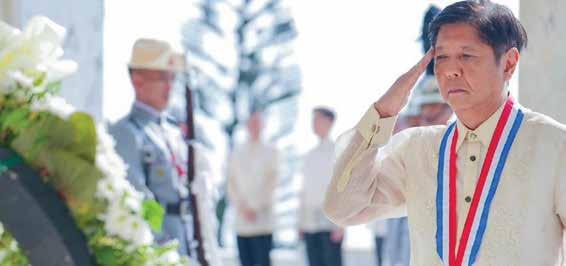
7 minute read
For uninsured people with cancer, securing care can be like spinning a roulette wheel
by Charlotte huff Kaiser Health News
EIGHTEEN months after April Adcox learned she had skin cancer, she finally returned to Charleston’s Medical University of South Carolina last May to seek treatment.
Advertisement
By then, the reddish area along her hairline had grown from a 2-inch circle to cover nearly her entire forehead. It oozed fluid and was painful.
“Honestly, I was just waiting on it to kill me, because I thought that’s what was going to have to happen,” said the 41-year-old mother of three, who lives in Easley, South Carolina.
Adcox had first met with physicians at the academic medical center in late 2020, after a biopsy diagnosed basal cell carcinoma. The operation to remove the cancer would require several physicians, she was told, including a neurosurgeon, because of how close it was to her brain.
But Adcox was uninsured. She had lost her automotive plant job in the early days of the pandemic, and at the time of her diagnosis was equally panicked about the complex surgery and the prospect of a hefty bill. Instead of proceeding with treatment, she attempted to camouflage the expanding cancerous area for more than a year with hats and long bangs.
If Adcox had developed breast or cervical cancer, she likely would have qualified for insurance coverage under a federal law that extends Medicaid eligibility to lower-income patients diagnosed with those two malignancies. For female patients with other types of cancer, as well as pretty much all male patients, the options are scant, especially in South Carolina and the 11 other states that haven’t yet implemented Medicaid expansion, according to cancer physicians and health policy experts who study access to care.
In the face of potentially daunting bills, uninsured adults sometimes delay care, which can result in worse survival outcomes, research shows. The odds of patients getting insurance to help cover the cost of treatment play out a bit like a game of roulette, depending upon where they live and what type of cancer they have.
“It is very random — that’s, I think, the heartbreaking part about it,” said Dr. Evan Graboyes, a head and neck surgeon and one of Adcox’s physicians. “Whether you live or die from cancer shouldn’t really be related to what state you live in.”
The Affordable Care Act gave states the option to expand Medicaid eligibility and cover more people. Shortly after the law passed, just 2.6% of adults ages 18 to 64 with a new cancer diagnosis lacked insurance in Medicaid expansion states versus 7.8% in nonexpansion states, according to a study published in JAMA Oncology in 2018. Researchers at the American Cancer Society, who conducted the analysis, estimate that about 30,000 uninsured people are diagnosed with cancer each year.
But in all states, lower-income uninsured patients with breast or cervical cancer may have another route for coverage, even if they don’t otherwise qualify for Medicaid. Adults with cancer detected through the National Breast and Cervical Cancer Early Detection Program can enroll in Medicaid for the duration of their cancer treatment, as a result of advocacy efforts and federal legislation that started more than three decades ago.
In 2019, 43,549 breast and cervical cancer patients were enrolled, according to a Government Accountability Office report published in 2020.
“If you’re lucky to be diagnosed with breast or cervical cancer, you’re good,” said Dr. Fumiko Chino, a radiation oncologist at Memorial Sloan Kettering Cancer Center in New York City, who studies cancer treatment access and affordability. “But otherwise, you may have some significant obstacles.”
The total amount billed to the insurer during the year following a cancer diagnosis can be steep. For instance, costs in 2016 averaged $168,730 for lung cancer and $137,663 for colorectal cancer, according to a 2022 study that calculated insurance claims for several common malignancies diagnosed in privately insured patients.
Since uninsured adults can struggle to afford preventive care, their cancer may not be identified until it’s more advanced, making it costlier for the patient and the health system, said Robin Yabroff, an author of the study in JAMA Oncology and a scientific vice president at the American Cancer Society.
Patients who can’t get financial assistance through a safetynet facility sometimes rack up medical debt, use credit cards, or launch fundraising efforts though online sites, Yabroff said.
“We hear stories of people who mortgage their homes to pay for cancer treatment.”
Cancer patients can purchase insurance through the ACA health insurance marketplace. But they often must wait until the regular enrollment period near the end of the year, and those health plans don’t become effective until the start of the next calendar year.
That’s because the federal law was designed to encourage people to sign up when they are healthy, which helps control costs, said MaryBeth Musumeci, an associate teaching professor of health policy and management at George Washington University in Washington, D.C. If a new diagnosis were a qualifying event for new coverage, she said, “then it would incentivize people to stay uninsured while they were healthy and they didn’t think they really were going to need coverage.”
Meanwhile, the on-ramp to Medicaid coverage for lowerincome patients with breast and cervical cancer is a story of successful advocacy, dating to a 1990 law that created the national breast and cervical screening program. Mammography started to be widely recommended in the 1980s, and advocacy groups pushed to reach more underserved individuals, said Katie McMahon, a policy principal at the American Cancer Society Cancer Action Network, the organization’s advocacy arm. But research showed that some uninsured adults struggled to get care for those cancers detected through the screening program, McMahon said. A 2000 law allowed states to extend Medicaid to them, and by 2008 all 50 states and the District of Columbia had done so, according to the 2020 GAO report. For other cancer patients, one of the remaining avenues to
Marcos urges Filipinos to speak up vs...
Filipino,” the President said.
“We have staunchly proven time and again that we are never the same after each adversity for we always rise to meet every challenge head-on with grit, grace, and determination,” he added.
Marcos also called on Filipinos to make “wise and sound decisions” to address the country’s pressing problems with compassion and concern for others.
“As the legacy of our heroes and heroines came at a great and hefty cost, may we also reexamine our values and honor their lives by speaking up against discrimination, extending help to those in need, and working towards a better future,” he added.
Noting that their forebears sacrificed and fought long and hard to defend the nation’s freedom, Marcos reminded Filipinos that their actions today determine the future of the Philippines, including the next generations.
“Together, let us strive towards developing a more humane, fair, and progressive society that allows our citizenry to relish their liberty and achieve their individual and collective aspirations,” the Chief Executive said.
Araw ng Kagitingan commemorates the Fall of Bataan in 1942, when Filipino and American soldiers bravely resisted huge numbers of Japanese invaders. The event is celebrated every April 9, but since it fell on a Sunday this year, the holiday will be observed today, in line with the holiday economics adopted by the Marcos administration.
Ceremonies commemorating the 81st anniversary of the Araw ng Kagitingan was held on Monday, April 10 at the Mt.
Samat National Shrine in Pilar, Bataan. Marcos led the event, which were attended by war veterans, dignitaries from Japan and the U.S. and officials of the National Historical Commission of the Philippines and the local government of Bataan.
The theme of this year’s commemoration is “Kagitingan ng mga Beterano, Pundasyon ng Nagkakaisang Pilipino (Veterans’ Heroism, Foundation of United Filipinos).”
Never forget Speaker Martin Romualdez reminded the nation never to forget the sacrifices made by the generation of Filipinos who made it through or were martyred during the Fall of Bataan in the name of regaining the country’s freedom.
“We suffered, we fought, and we prevailed,” said the Leyte congressman who heads the 312-member House of Representatives. “We honor and recognize our heroes, who willingly laid down their lives so that we can enjoy the blessings of freedom today.”
“As we look back into that dark day, we must never forget the sacrifices of Filipino resistance fighters who stood up against the might of foreign invaders in World War II, which gave the rest of our nation the inspiration and strength to fight on,” Romualdez, an administration stalwart and cousin of the President, said.
He said the event is a “historic reminder that Filipinos will always fight on, move forward and prevail with unity,” which reflect the same fortitude that carried the nation through the COVID-19 pandemic.
“Let this day remind us that we are strong as a nation, that faced even with seemingly insurmountable odds, we will always prevail as long as we are united, and as long as we continue to draw our strength from the virtues of our heroes,” Romualdez said. “We do not give up, we press forward, and we overcome.”
‘Defend Phl sovereignty’
In its own message, the Federation of Free Workers (FFW) urged the citizenry to continue fighting for the country’s territorial integrity and sovereignty.
“As the Filipino nation pays tribute to the heroism and sacrifice of our veterans, the FFW also honors the sacrifices of our soldiers who continue to defend our nation’s sovereignty and protect our people. Let us stand together as a nation in upholding our rights and freedom,” FFW president Sonny Matula said in a statement.
Victoria Bellosillo, FFW Women Network president, also expressed support and gratitude to members of the Armed Forces of the Philippines (AFP) stationed in the disputed areas of the West Philippine Sea.
“As they serve and defend our territorial integrity, we also remind our armed forces that it is their solemn duty to defend the dignity and human rights of our people,“ Bellosillo said.

While the labor group supports all peaceful and diplomatic means to resolve the country’s territorial disputes with China, it called on the government to prepare able citizens as reserve forces on a voluntary basis to support the AFP in case of any eventuality.
The FFW stressed the need to ensure that the country is always ready to defend the nation’s territorial integrity and sovereignty. g






